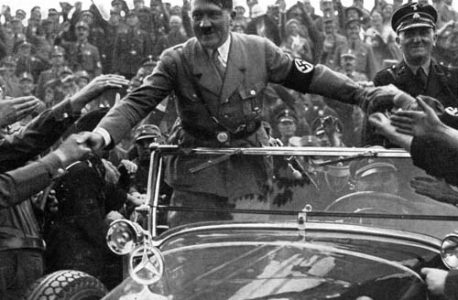Originally posted on Russia Insider
Bourgeois and intellectual political groups never effect real change. To overturn a corrupt order, you need a revolutionary movement with devoted, disciplined followers and a simple, clear doctrine.
The following, taken from Mein Kampf, vol. 2, chapter 5, Adolf Hitler explains what a political movement must do to overturn an entrenched political order.
Poltical parties nearly always start out with the intent to win complete and exclusive mastery for their philosophy (Weltanschauung)…. But the limited nature of their policy-program is in itself enough to rob them of that heroic spirit which a philosophy demands.
The spirit of conciliation which animates their will attracts those petty and chicken-hearted people who are not fit to be protagonists in any crusade. That is the reason why they mostly become struck in their miserable pettiness very early on the march. They give up fighting for their ideology and, by way of what they call ‘positive collaboration,’ they try as quickly as possible to wedge themselves into some tiny place at the trough of the existent regime and to stick there as long as possible. Their whole effort ends at that.
And if they should get shouldered away from the common manger by a competition of more brutal manners then their only idea is to force themselves in again, by force or chicanery, among the herd of all the others who have similar appetites, in order to get back into the front row, and finally – even at the expense of their most sacred convictions – participate anew in that beloved spot where they find their fodder. They are the jackals of politics.
But a general philosophy of life will never share its place with something else. Therefore it can never agree to collaborate in any order of things that it condemns. On the contrary it feels obliged to employ every means in fighting against the old order and the whole world of ideas belonging to that order and prepare the way for its destruction.
These purely destructive tactics, the danger of which is so readily perceived by the enemy that he forms a united front against them for his common defence, and also the constructive tactics, which must be aggressive in order to carry the new world of ideas to success – both these phases of the struggle call for a body of resolute fighters. Any new philosophy of life will bring its ideas to victory only if the most courageous and active elements of its epoch and its people are enrolled under its standards….
To achieve this purpose it is absolutely necessary to select from the general system of doctrine a certain number of ideas which will appeal to such individuals and which, once they are expressed in a precise and clear-cut form, will serve as articles of faith for a new association of men. While the programme of the ordinary political party is nothing but the recipe for cooking up favourable results out of the next general elections, the programme of a philosophy represents a declaration of war against an existing order of things, against present conditions, in short, against the established view of life in general.
It is not necessary, however, that every individual fighter for such a new doctrine need have a full grasp of the ultimate ideas and plans of those who are the leaders of the movement. It is only necessary that each should have a clear notion of the fundamental ideas and that he should thoroughly assimilate a few of the most fundamental principles, so that he will be convinced of the necessity of carrying the movement and its doctrines to success. The individual soldier is not initiated in the knowledge of high strategical plans. But he is trained to submit to a rigid discipline, to be passionately convinced of the justice and inner worth of his cause and that he must devote himself to it without reserve. So, too, the individual follower of a movement must be made acquainted with its far-reaching purpose, how it is inspired by a powerful will and has a great future before it.
Supposing that each soldier in an army were a general, and had the training and capacity for generalship, that army would not be an efficient fighting instrument. Similarly a political movement would not be very efficient in fighting for a philosophy if it were made up exclusively of intellectuals.
No, we need the simple soldier also. Without him no discipline can be established.
By its very nature, an organization can exist only if leaders of high intellectual ability are served by a large mass of men who are emotionally devoted to the cause. To maintain discipline in a company of two hundred men who are equally intelligent and capable would turn out more difficult in the long run than in a company of one hundred and ninety less gifted men and ten who have had a higher education.
The Social-Democrats have profited very much by recognizing this truth. They took the broad masses of our people who had just completed military service and learned to submit to discipline, and they subjected this mass of men to the discipline of the Social-Democratic organization, which was no less rigid than the discipline through which the young men had passed in their military training. The Social-Democratic organization consisted of an army divided into officers and men. The German worker who had passed through his military service became the private soldier in that army, and the Jewish intellectual was the officer. The German trade union functionaries may be compared to the non-commissioned officers.
The fact, which was always looked upon with indifference by our middle-classes, that only the so-called uneducated classes joined Marxism was the very ground on which this party achieved its success. For while the bourgeois parties, because they mostly consisted of intellectuals, were only a feckless band of undisciplined individuals, out of much less intelligent human material the Marxist leaders formed an army of party combatants who obey their Jewish masters just as blindly as they formerly obeyed their German officers.
The German middle-classes, who never bothered their heads about psychological problems because they felt themselves superior to such matters, did not think it necessary to reflect on the profound significance of this fact and the secret danger involved in it. Indeed they believed that a political movement which draws its followers exclusively from intellectual circles must, for that very reason, be of greater importance and have better grounds for its chances of success, and even a greater probability of taking over the government of the country than a party made up of the ignorant masses.
They completely failed to realize the fact that the strength of a political party never consists in the intelligence and independent spirit of the rank-and-file of its members but rather in the spirit of willing obedience with which they follow their intellectual leaders. What is of decisive importance is the leadership itself.

